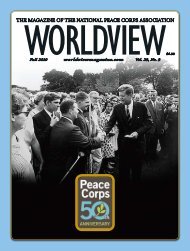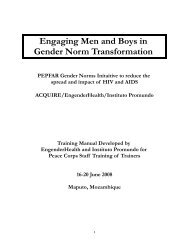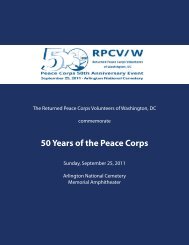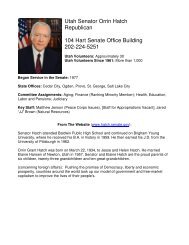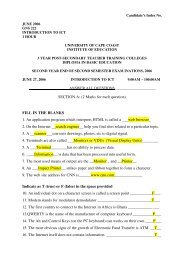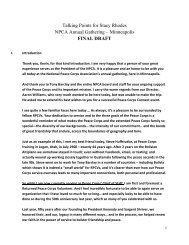- Page 1 and 2:
The Pennsylvania State UniversityTh
- Page 3 and 4:
ABSTRACTiiiIn 1961 John F. Kennedy
- Page 5 and 6:
Visual Rhetorics are Politically Ch
- Page 7 and 8:
2Five months later, in his January
- Page 9 and 10:
4evening news with Walter Cronkite,
- Page 11 and 12:
6important as it guarantees the org
- Page 13 and 14:
8volunteer service an appealing loo
- Page 15 and 16:
10teaching school children about ot
- Page 17 and 18:
12turnover and shrinking budgets, t
- Page 19 and 20:
14program simply because he feels i
- Page 21 and 22:
16appealing to a new type of volunt
- Page 23 and 24:
18ever less connected with one anot
- Page 25 and 26:
20Political DisengagementOne of the
- Page 27 and 28:
22devaluing of the public sector ov
- Page 29 and 30:
24has broad residual effects. Almos
- Page 31 and 32:
26Review of LiteratureA review of p
- Page 33 and 34:
28served overseas with the Peace Co
- Page 35 and 36:
30holds a space in the hearts of Am
- Page 37 and 38:
32policy changes. I turn to Public
- Page 39 and 40:
34Chapter 2Recruiting the 21 st Cen
- Page 41 and 42:
36New Recruitment RhetoricThe AdCou
- Page 43 and 44:
38go?” In 1999, the Peace Corps b
- Page 45 and 46:
40American values. The key rhetoric
- Page 47 and 48:
42upon recommending the establishme
- Page 49 and 50:
44While the wording of these print
- Page 51 and 52:
46the major emphases in recruitment
- Page 53 and 54:
48audience. Each of the two radio s
- Page 55 and 56:
50the speaker asks, “Would you cr
- Page 57 and 58:
52and walks toward a kiosk with a p
- Page 59 and 60: 54All of the PSAs, regardless of me
- Page 61 and 62: 56expanded menu of options, includi
- Page 63 and 64: 58Volunteers are college graduates
- Page 65 and 66: 60life when you get back. Or you ma
- Page 67 and 68: 62People of ColorThe largest, most
- Page 69 and 70: 64The other major recruitment tools
- Page 71 and 72: 66Figure 2.7Aside from the main hom
- Page 73 and 74: 68For many, the image of the organi
- Page 75 and 76: 70Chapter 3Framing the World: Visua
- Page 77 and 78: 72This chapter analyzes the visual
- Page 79 and 80: 74the whole enterprise. This very p
- Page 81 and 82: 76genres, cultural norms, ideograph
- Page 83 and 84: 78experienced, and explored.” 152
- Page 85 and 86: 80very many children at all. These
- Page 87 and 88: 82volunteer as a “real” person,
- Page 89 and 90: 84Figure 3.11 Figure 3.12There exis
- Page 91 and 92: 86group of children, such as in fig
- Page 93 and 94: 88Figure 3.18 Figure 3.19The pictur
- Page 95 and 96: 90cleanest and most attractive to t
- Page 97 and 98: 92primitive lives. As evidenced by
- Page 99 and 100: 94recruitment rhetoric of today foc
- Page 101 and 102: 96Volunteers quite often post pictu
- Page 103 and 104: 98Chapter 4Beyond the New Frontier:
- Page 105 and 106: 100people are dissatisfied with tod
- Page 107 and 108: 102perceive their service as helpfu
- Page 109: 104“It's just that every time I t
- Page 113 and 114: 108me to join the Peace Corps - the
- Page 115 and 116: 110type of actual work. I'm suppose
- Page 117 and 118: 112like what’s the point?! This p
- Page 119 and 120: 114volunteer in El Salvador, in her
- Page 121 and 122: 116asks me what I am eating for lun
- Page 123 and 124: 118makes it impossible to keep goin
- Page 125 and 126: 120family who were fasting, she was
- Page 127 and 128: 122further define the divide betwee
- Page 129 and 130: 124Aaron’s “Once everything is
- Page 131 and 132: 126Peace Corps critique and comment
- Page 133 and 134: 128mimicked the blogging phenomenon
- Page 135 and 136: 130Chapter 5Looking Forward: Peace
- Page 137 and 138: 132The proposed fourth goal, inspir
- Page 139 and 140: 134doesn’t repeat his call on Ame
- Page 141 and 142: 136for better working relationships
- Page 143 and 144: 138In an effort to increase post Se
- Page 145 and 146: 140United States government. They r
- Page 147 and 148: 142American image to international
- Page 149 and 150: 144others. In Chapter Three, the Pe
- Page 151 and 152: Notes1 John F. Kennedy, “Remarks
- Page 153 and 154: 14823 Peace Corps, “About the Pea
- Page 155 and 156: 15045 Public service announcements
- Page 157 and 158: 15269 Terry L. Cooper, “Civic Eng
- Page 159 and 160: 154http://peacecorpsonline.org/mess
- Page 161 and 162:
156114 Quarter-life crisis is a ter
- Page 163 and 164:
158133 Graham C. Clarke, The Photog
- Page 165 and 166:
160146 Cara Finnegan, Picturing Pov
- Page 167 and 168:
162171 “Blogsphere sees Healthy G
- Page 169 and 170:
164189 Casey - PeaceCorps - Ghana,
- Page 171 and 172:
166214 Gittlemana, comment posted o
- Page 173 and 174:
168235 Ibid.236 Ibid.237 The Citize
- Page 175 and 176:
170254 “President Launches USA Fr
- Page 177 and 178:
172Delli Carpini, Michael X. “Gen
- Page 179 and 180:
174Meister, Mark. “Sustainable De
- Page 181:
Casey Malone MaughCurriculum Vitae6









